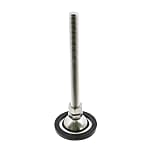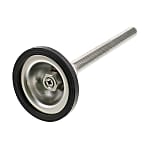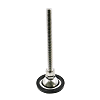(!)NOTE : Windows 7 users won’t be able to use some latest features of eCatalog/WOS since Microsoft is ending support for Windows 7 on 14 Jan, 2020. Please upgrade your system for uninterrupted services.
- Scheduled Maintenance Notice: This site will be unavailable due to scheduled maintenance from 6:30 24/11/2024 to 4:30 (IST) 25/11/2024. We apologize for the inconvenience.
- Please note that the MISUMI Pune office and warehouse will be closed on November 20th due to the state election.
- Notice of End of Sales for Economy Series Pneumatic Equipment Category. More information.
Adjuster Bolt(Properties:Electrical Conductivity)
Brand |
|
|---|---|
| CAD |
|
| Days to Ship |
|
1 items
- Sort By
-
You can add up to 6 items per a category to the compare list.



MISUMI
- Leveling Mount Non- Slip Type
- Part number for series including of is FJGN, FJGM, FJGNS and FJGMS.
- Body Material: SS400 Steel and SUS304 Stainless steel.
- Body Surface Treatment: Trivalent Chromate and Electrolytic Polishing.
- Rubber Material: Elastomer, Neoprene, Non-Migration Chloroprene Rubber, Electrically Conductive Rubber, PVC (Dark Blue).
- Nominal of Thread size (M): 8, 10, 12, 16 and 20.
- Thread Length size: 50, 75, 100, 125, 130, 150 and 180 mm.
- Screw shaft turns independently of the base and tilts slightly.- Volume Discount
Thread Length L1(mm) Nominal of Thread M(mm) Type Main Body Height E(mm) Adjusting Bolt Shape Type Body Material Properties Bottom Rubber Material Mounting Shape Type Thread Material Main Body Surface Treatment Swivel Angle θ(deg) Height Adjusting Handle Thread Surface Treatment Swivel Mechanism 50 ~ 180 8 ~ 16 Adjusting Bolt 15 ~ 25 Rubber Foot Type Stainless Steel Electrical Conductivity Synthetic Rubber - Stainless Steel Electrolytic Polishing - Not Provided Electrolytic Polishing Not Provided From: ₹ 749.98 Days to Ship: 6 Day(s) or more  6 Day(s) or more
6 Day(s) or more
| Brand |
|---|
| Product Series |
| CAD |
| From |
| Days to Ship |
| Thread Length L1(mm) |
| Nominal of Thread M(mm) |
| Type |
| Main Body Height E(mm) |
| Adjusting Bolt Shape Type |
| Body Material |
| Properties |
| Bottom Rubber Material |
| Mounting Shape Type |
| Thread Material |
| Main Body Surface Treatment |
| Swivel Angle θ(deg) |
| Height Adjusting Handle |
| Thread Surface Treatment |
| Swivel Mechanism |
You can add up to 6 items per a category to the compare list. | |
| Brand | MISUMI |
| Product Series | |
| CAD |
|
| From | ₹ 749.98 |
| Days to Ship | 6 Day(s) or more |
| Thread Length L1(mm) | 50 ~ 180 |
| Nominal of Thread M(mm) | 8 ~ 16 |
| Type | Adjusting Bolt |
| Main Body Height E(mm) | 15 ~ 25 |
| Adjusting Bolt Shape Type | Rubber Foot Type |
| Body Material | Stainless Steel |
| Properties | Electrical Conductivity |
| Bottom Rubber Material | Synthetic Rubber |
| Mounting Shape Type | - |
| Thread Material | Stainless Steel |
| Main Body Surface Treatment | Electrolytic Polishing |
| Swivel Angle θ(deg) | - |
| Height Adjusting Handle | Not Provided |
| Thread Surface Treatment | Electrolytic Polishing |
| Swivel Mechanism | Not Provided |
Loading...
Configure
Specification/Dimensions
-
Thread Length L1(mm)
- 9
- 11.6
- 14
- 16
- 17
- 17.5
- 18
- 19
- 20
- 21
- 22
- 23
- 24
- 25
- 25.5
- 26
- 26.5
- 27
- 27.5
- 28
- 28.5
- 29
- 30
- 31
- 31.5
- 32
- 34
- 35
- 36
- 36.5
- 38
- 40
- 42
- 43
- 45
- 50
- 52
- 52.5
- 58
- 60
- 63
- 65
- 66
- 67.5
- 68
- 70
- 71
- 75
- 80
- 85
- 90
- 91
- 98
- 100
- 108
- 110
- 114
- 117.5
- 120
- 122
- 124
- 125
- 126
- 127
- 129
- 130
- 132
- 132.5
- 135.5
- 138
- 142
- 144
- 145
- 148
- 150
- 154
- 156
- 157
- 158
- 159
- 160
- 162
- 162.5
- 165.5
- 168
- 170
- 172
- 174
- 175
- 176
- 177
- 179
- 180
- 182
- 182.5
- 184
- 185.5
- 198
- 200
- 206
- 207
- 209
- 210
- 212
- 212.5
- 215.5
- 220
- 250
- 280
- 300
-
Nominal of Thread M(mm)
-
Type
- Adjusting Bolt
- Mounting
- Precision Instrument
- Others
- Adjusting Screw with Rubber Grommet
-
Main Body Height E(mm)
- 4
- 5
- 5.4
- 6
- 7
- 8
- 8.5
- 9
- 9.5
- 9.7
- 9.8
- 10
- 10.5
- 11
- 11.2
- 11.5
- 12
- 12.5
- 13
- 13.5
- 13.7
- 14
- 15
- 15.5
- 16
- 16.5
- 17
- 17.5
- 17.7
- 18
- 18.5
- 19
- 20
- 20.5
- 20.7
- 21
- 21.5
- 22
- 22.5
- 23
- 23.5
- 24
- 25
- 26
- 27
- 28
- 28.2
- 29
- 29.5
- 30
- 30.5
- 31.5
- 32
- 32.5
- 33
- 33.2
- 35
- 35.4
- 35.5
- 36.5
- 37
- 39
- 40
- 41
- 42
- 42.5
- 44
- 44.5
- 45
- 46.5
- 47
- 48.5
- 50
- 51
- 52
- 54
- 55
- 55.5
- 56
- 56.5
- 60
- 60.5
- 61
- 62
- 63
- 64.5
- 65
- 65.5
- 66
- 67.5
- 69
- 70
- 70.5
- 71
- 71.5
- 72
- 73
- 75
- 76
- 76.5
- 77
- 77.5
- 78.5
- 79
- 79.5
- 80
- 81
- 82.5
- 83.5
- 84.5
- 85
- 85.5
- 91
- 92
- 93
- 94
- 95
- 96.5
- 97
- 99.5
- 100
- 101
- 101.5
- 102.5
- 104
- 105
- 106.5
- 107
- 108
- 109
- 109.5
- 110
- 111
- 112
- 113.5
- 114.5
- 115
- 116
- 117
- 117.5
- 119
- 119.5
- 121
- 121.5
- 122.5
- 123
- 125
- 126
- 127
- 128
- 129
- 130
- 131
- 132
- 133
- 134
- 135
- 136
- 137
- 138
- 139
- 140
- 140.5
- 142
- 143
- 144
- 145
- 148
- 149
- 150
- 151
- 152
- 153
- 154
- 154.5
- 155
- 156
- 157
- 158
- 159
- 160
- 160.5
- 161
- 162
- 163
- 163.5
- 165
- 168
- 170
- 173
- 175
- 176
- 177
- 178
- 179
- 180
- 181
- 182
- 183
- 184
- 184.5
- 185
- 186
- 186.5
- 187
- 188
- 189
- 190
- 190.5
- 192
- 193
- 193.5
- 195
- 195.5
- 198
- 200
- 207
- 208
- 210
- 211
- 214
- 216.5
- 217
- 220
- 222
- 225
- 225.5
- 227
- 228
- 230
- 231
- 232
- 234
- 234.5
- 235
- 236
- 236.5
- 237
- 238
- 240
- 242
- 243
- 243.5
- 245
- 245.5
- 248
- 250
- 281
- 400
-
Adjusting Bolt Shape Type
-
Body Material
-
Properties
- Standard
- Corrosion Resistance
- Oil Resistance
- Chemical Resistance
- Heat Resistance
- Vibration Control
- Impact Resistance
- Electrical Conductivity
-
Bottom Rubber Material
-
Mounting Shape Type
-
Thread Material
-
Main Body Surface Treatment
-
Swivel Angle θ(deg)
-
Height Adjusting Handle
-
Thread Surface Treatment
-
Swivel Mechanism
Related Categories to Adjuster Bolt
FAQ Adjuster Bolt
- Question: Can Adjuster Bolt (leveling mount) be used for heavy-duty applications?
- Answer: Yes, Adjuster Bolt (leveling mount) can be used for heavy-duty applications. They are designed to support and level heavy machinery, equipment, and furniture. By allowing easy adjustments, they ensure stability and safety on uneven surfaces, making them suitable for heavy-duty tasks.
- Question: What are the common material and uses of an adjuster?
- Answer: Common materials for Adjuster Bolt (leveling mount) include metal (such as steel or stainless steel) and high-strength plastics. They are used in various applications, like leveling heavy machinery, workbenches, and furniture. Adjuster Bolts (leveling mount) provide easy height adjustments and stability, making them essential for aligning and supporting equipment on uneven surfaces.
- Question: How to install adjuster?
- Answer: To install an adjuster, follow these steps:
1. Clean the equipment's base or legs to remove dirt and debris.
2. Position the adjuster under each leg or corner of the equipment.
3. Use a wrench or hand tool to turn the adjuster clockwise to raise it to the desired height.
4. Ensure all Adjuster Bolt (leveling mount) are evenly adjusted for stability.
5. Test the equipment to confirm it is level and secure. Adjust as needed. - Question: How can I determine the right size of an adjuster for my project?
- Answer: To find the right size of an adjuster for your project, do the following:
1. Measure the diameter of your equipment's legs or base.
2. Check how much weight the adjuster needs to support.
3. Choose an adjuster with the same diameter and enough weight capacity.
4. Make sure the adjuster's height range fits your needs.
5. Read the specifications to ensure it matches your equipment. - Question: How can I measure the torque on an adjuster?
- Answer: To measure torque on an adjuster, use a torque wrench. Set the desired torque value on the wrench, position it on the adjuster's nut or bolt, and apply force. As you turn the wrench, it displays the torque value. Stop when you reach the required torque. Proper torque ensures the adjuster is tightened correctly and prevents damage or instability. Follow the manufacturer's recommendations for the right torque values.






How can we improve?
How can we improve?
Thank you for your time.
Your feedback is essential for our continuous improvement
Privacy Policy
Thank you for your cooperation.
Thank you for your time.
Your feedback is essential for our continuous improvement
Please use the inquiry form.
Privacy Policy